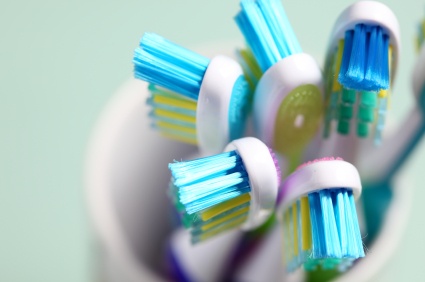By Erica Laceria on Mar 19, 2015 @ 03:03 PM
We’ve all likely heard them at some point. Those urban legends passed on from generation to generation—tales and beliefs told by our parents’ parents that continue on to this day. You’d be surprised about the dental myths that still exist to this day…and I’m here to debunk them!
Myth: Cola Can Dissolve a Tooth Overnight
This is a good one. In the early 1950s, a professor from Cornell University wanted to show Americans the power of cola to cause cavities. He presented the Congressional committee on food additives with some crazy claims—that cola could eat through the steps of the Capitol building, and that a tooth placed in a glass of cola would dissolve within several days. However, McCay's assertions overlooked the fact that saliva’s job in the mouth is to wash away harmful particles—and, in reality, people really don't hold soda in their mouth overnight.
Attempts to recreate this experiment showed that McCay’s claims were highly exaggerated. A tooth won't completely dissolve in a glass of cola overnight, or even in a couple of days. However, the acids in colas and other popular drinks can lower the pH of saliva for a short time. This can soften tooth enamel and allow sugar to cause tooth decay.
Myth: The Whiter Your Teeth Are, the Healthier They Are
Teeth should definitely be on the whiter side. However, if you're looking in the mirror and they're not crispy white, don't fret - they may actually be healthier than your neighbor with the Colgate smile. The truth is, whiteness of teeth does not equivilate to an absence of infection or cavities. Teeth color vary from person to person. There are treatments available to make your teeth whiter, should you need it. But the important thing is to practice brushing and flossing effectively to avoid dental complications. A root canal or cavity is a much more severe issue than having teeth a few shades shy of crystal white.
Myth: You Must Brush Immediately After Every Meal
It’s understandable that you might want to…especially if you’ve eaten a super garlicy or oniony meal and want to freshen your breath. But should you right after every meal or every time you eat? No. Why? Because if you brush too soon after meals, you can scrub away protective enamel that your teeth need to stay healthy.
Saliva and enamel are the mouth’s defenses against bacteria. Saliva contains strong enzymes and antibacterial substances that break down food particles and wash them away. And, although enamel is the hardest substance in our bodies, the acid in our mouths after eating softens it temporarily. So you don’t weaken enamel, it’s better to wait 30-60 minutes to brush so your body can do its job of breaking down foods first.
Myth: Extreme Hot and Cold Can Crack your Teeth
Ok, so extreme temperatures from food or liquids can crack your teeth—but not in a dramatic, wide open way. Our teeth are built to withstand various temperatures in the mouth, but even so, little hairline cracks on the surface of enamel can occur. They’re actually common, but so minor that they rarely threaten the tooth itself.
Seeing your dentist regularly can help make sure minor cracks aren’t the result of a bigger problem. It’s best to catch cracks early on. How come? Ready to wince? Chewing causes a cracked tooth to open and close. This eventually exposes nerves inside the tooth. Yeah…you’ll want to avoid that!
Myth: George Washington had Wooden Teeth!
Washington began losing teeth in his twenties. When he became president in 1789, he had only ONE tooth! So, a well-regarded dentist created several sets of prosthetics for him. He used metals and ivory from hippos to make upper and lower mouth plates connected by gold-wire springs.
They weren’t wood, but those prosthetics sound like torture. While the springs were made to keep the plates in place, they also forced Washington’s mouth open. So he had to consciously work to keep his mouth closed. Apparently he found them so uncomfortable that he kept his speeches to a minimum. His second inaugural address was the shortest in presidential history—only 135 words!
Myth: The More Sugar you Consume, the Worse your Teeth Will Be
While sugar is definitely bad for your teeth, it’s not the sugar that deteriorates them. Bacteria in the mouth needs processed sugar to survive. However, studies show that if you don’t consume sugar but have poor oral hygiene habits, the result is the same.
It's okay to have sugar - in moderation. The most important takeaway from this myth is that in order to preserve your teeth, regardless of what you eat, it's imperative to keep up your oral hygiene practices.





comments